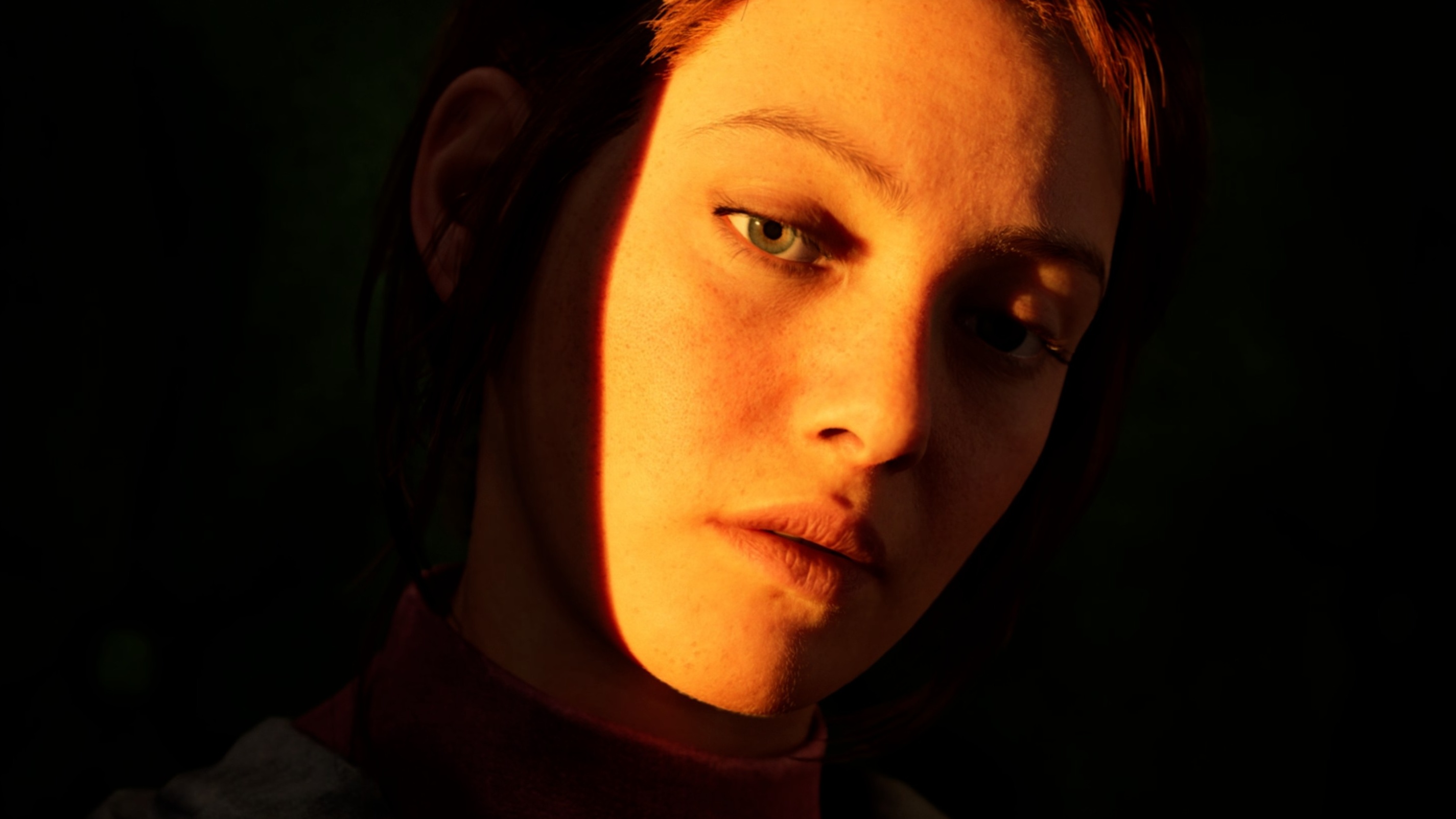Maupiti Island was a detective game unlike any other
We're rerunning Richard Cobbett's classic Crapshoot column, in which he rolled the dice and took a chance on obscure games—both good and bad.

From 2010 to 2014 Richard Cobbett wrote Crapshoot, a column about rolling the dice to bring random games back into the light. This week, a detective mystery that you could call the Dark Souls of adventure games... except that Dark Souls at least had a decent translator on its side.
Consider the bullet well and truly bitten. Maupiti Island is one of those games that's been on my list for years now, and I mean that literally. To know it is to be obsessed by it. To actually play it, well, that's another matter. To decrypt its secrets, and I don't even mean in terms of plot, practically demands a Rosetta stone—along with the standard adventurer supply of a really big bag of Malteasers. It only takes 10 minutes to finish, but getting to the point where you can do that legitimately... and have a clue what's going on... could be a matter of months, or even years.
This is Maupiti Island, a murderous place of sin and confusion and pixel-hunting from which careless visitors may never truly find mental escape. Well, that's what it was like before the internet anyway. Hurrah for walkthroughs, eh?
This is the sequel to another adventure game, Mortville Manor, both of which are Jereme Lange mysteries—Lange being a private investigator who initially looked a heck of a lot like Humphrey Bogart and sounds, literally, like a Speak and Spell. In that game, you were in a mansion to help an old friend, while in this one you get caught in a cyclone and forced to moor your boat on the titular island of inevitable mystery. Specifically, a girl called Marie has gone missing, the island holds an ancient secret, and Lange has nothing better to do with his time for a bit, so agrees to help out. So far, so every detective adventure. Laura Bow, Cruise For a Corpse, Hopkins FBI... it's all pretty standard genre stuff.
At least, until you get to the details, where the plot soon thickens like cheap custard.
Maupiti Island was an attempt to create a more realistic kind of detective story, and to give credit, it was damn ambitious for 1990. These were great graphics, and this was one of the most intricately detailed environments available for poking and prodding. The whole game is played out in pseudo-realtime, with characters constantly moving around the island (admittedly, only shown via a cast list on the side of the screen), and they even talk! Well, they sort of talk. You know how sometimes you get an idea, and it's a really bad idea, but by that point you're so busy actually doing it that the sheer inescapable suffocating badness of the idea doesn't seem to matter any more? That's the only reason I can think of why Lankhor decided to use text to speech-to-voice all their characters.
How did this never catch on? It's a mystery. Luckily, the writing totally makes up for it. Just kidding, no it doesn't. It's not often I find myself "too much information" during a detective game, but Maupiti Island manages it.
Keep up to date with the most important stories and the best deals, as picked by the PC Gamer team.
But here's the thing. Behind this awful gimmick and one of the worst interfaces ever inflicted on the genre, and poor translation and a psychopathic aversion to player guidance and instant death traps that come out of nowhere and wait a second, where was I going with that? Ah, yes. Behind all that is a surprisingly fiendish, involving adventure. Quite a long way behind it, admittedly, but still.
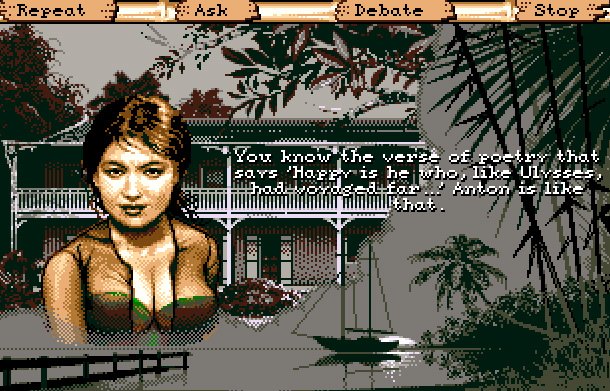
In particular, Maupiti Island tries what few other adventure games do: to simulate a world instead of just filling one with puzzles. It's far more freeform than its obvious counterpart, Roberta Williams' The Colonel's Bequest, with endlessly more depth and content than Jordan Mechner's wonderful The Last Express. Both of of those games are, I'd argue, ultimately better, if only because you can play them without feeling like an ice-pick is being jammed into your eye.
And when a Sierra Online adventure from Roberta "Murderpen" Williams is "the friendly one", you know Maupiti Island isn't messing around. After all, The Colonel's Bequest would murder you for using the shower, despite nobody in the mansion having any need to kill the main character.
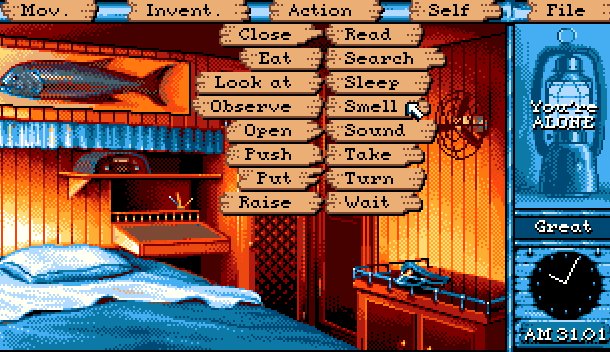
It's technically possible to complete Maupiti Island without ever leaving your boat's cabin. You're really only there because of a storm, and if you just sleep through the whole adventure, eventually the authorities will arrive and you can head on your way with nothing but a feeling that a designer somewhere is sobbing.
Being more active, it's possible to travel all over the island right from the start and follow people around to track their moves... at least until they catch you. You can bribe them. You can try beating them up. You can make notes of things that happen to throw back in their faces, with a whole conversation system built around debating: contradictions, bribes, showing evidence, and trying to hit people. Though this doesn't usually go well, only drawing weary responses like "You sure know how to talk to the ladies" and Lange's punches being so weak that the only person he actually manages to knock out his himself... with exhaustion.
No kidding. He wears himself out to the point of collapse, while they just stand there and sigh, and presumably deposit his comatose body into the sea when he's done. And sometimes he'll just straight up get murdered, because it sucks to be him.
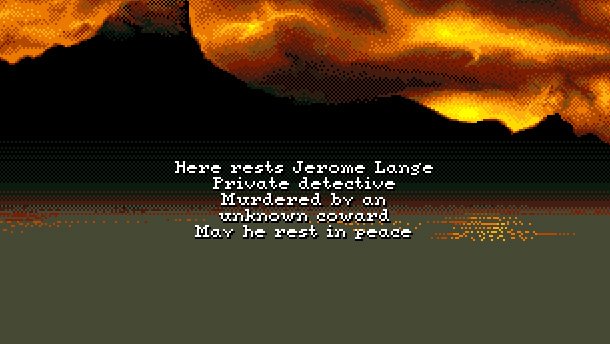
As time ticks on though, things happen whether you're around or not. One of the islanders is fished out of the sea, and another body shows up on the beach. Since you can't be everywhere, it's important to question other characters about what they saw during specific timeframes, and slowly... very, very slowly... assemble a vague idea of what's going on and what the awful English translation is trying to convey.
Even when it makes sense, it's usually robotic stuff, not helped by the fact the characters literally sound like robots, with lots of options seemingly giving no response and about a billion things to remember. You don't just say "What were you doing the night of the disappearance?" Oh no, instead you can ask every character about every single hour between the start of the game and the end, as well as every other character, and their opinions on every plot point from the bodies that start appearing to the backstory of the island itself. And, wow, do you need to! Bring a notepad or four.
Why? Not just because you want to understand the plot, though that helps. See, when the developers made Mortville Manor, they realised it was possible to solve it in roughly five picoseconds if you just did the necessary puzzles. So, to actually win the game you also had to pass a quiz. Maupiti Island does the same, letting you get to the very last location and then springing roughly a billion questions about every little scrap of the story before finally granting you access to the ending. And oh, what an ending it is! How generously it rewards all this effort! With a letter from the lost Marie saying "Yeah, this princess is in another castle. Meet you in the next game, maybe!"
And yes, another game was planned. After that somewhat less than explosive finale, there's a whole second screen of text that more or less just goes "Well, that's that then, all's well that ends well. Next game, Japan!" Though that never happened, possibly because its name was to be "Soukiya" and even at the time, marketing people knew there would never be a soukiya sequel than Duke Nukem Forever.
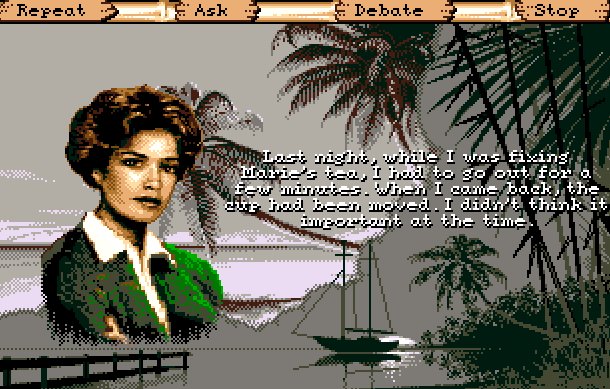
It's hard to think of an adventure less fun or enjoyable than this one, and that's saying something considering that a) I've played Shadowgate and b) really do hate to miss a chance to snark at Myst's expense. But it's true. From its translation to its interface, Maupiti Island is a painful experience that doesn't seem to know the meaning of reward. It's a masochist's playpit, where the only toy is a Rubik's Cube covered in razor blades.
If something can be done badly, chances are Maupiti Island does it horribly, be it spitting out snide error messages when you try to do basic actions, or its first class degree with honours in pixelbitching from Frustration University. Maupiti? Ha. It has no pity.
But.
Buuuuuuuuuuuuuut...
Despite all of that, there is method in its madness, and if you're willing to embrace it, no small amount of charm in its telling. The robotic voices that make it so hard to take the characters seriously do at least lighten up the stodgy dialogue with regular giggles, and that's before noticing the quaint innocence of Lange's room descriptions. Not for him is a pretty garden just a garden. Instead, it is "Before original sin..." A pier becomes "Ship of Fools." As he approaches a well, he quietly murmurs to himself "I wish I may, I wish I might," and in that moment it's so easy to imagine him pausing in the tropical heat to smile to himself at a joke nobody else heard or would have found funny, and be OK with that.
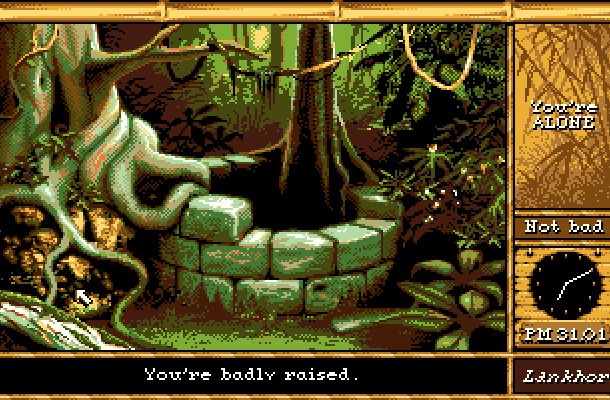
More importantly though, if you do take the time to get that notebook and pen, Maupiti Island is as close to being a detective as any game has ever got. Nothing is handed to you on a plate. If it served you hot stew for dinner, it would dump it into your hands, ignore your screams of pain and innocently ask if you'd like the salt. It's true the other characters are ridiculously willing to spout their life story at the stranger, from regretted virginity to full breakdowns of exactly who they want to see insert a cactus into their anus and sit on a rock.
Beyond that necessary conceit though, everything you discover is because you discover it, not because you've solved a puzzle. You've also discovered it in a living world that manages to feel alive even with its characters usually existing as nothing more than names in a list next to the (for the time, beautifully drawn) environments, with the basic writing that really doesn't work on a minute by minute basis at least giving way to lots to discover and piece together.
Does this mean I recommend playing it? Honestly, no.
But I am glad I have. That's worth something, at least.
Here's the version of the story where Lange is psychic and doesn't need any of your piddling clues to solve the mystery. There is a more involved version on YouTube, but unfortunately it's in French. Alternatively, if you dare you could track down a copy for yourself. You will hate it. You might also grow to love it. You may do both at the same time. But either way, I can guarantee you will never play anything quite like it ever again.
(And if you do, here's a proper walkthrough. You're welcome.)

